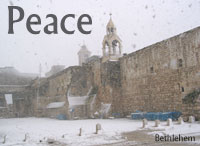
Bethlehem, Palestine, the birth place of Jesus Christ. Close to two millennia after his crucifixion in nearby Jerusalem, Bethlehem has become a city dominated by poverty, refugee camps, and an Apartheid Wall apparently attempting to choke any life that is left in this historic city. In many ways Bethlehem is the perfect embodiment of the tragic situation in Palestine, with slowly encroaching Jewish settlements that surround the town. Its land, water, and other resources are being expropriated illegally by the Israelis in a concentrated effort to make life even more unbearable for the indigenous Palestinians and refugees who call this city home. Since the Palestinian uprising began in 2000, an estimated 3,000 Christians in the Bethlehem area have moved abroad. The town’s population was around 90 per cent Christian until the creation of the state of Israel in 1948. Today they have dwindled to 35 per cent, according to a 23 December New York Times piece on the subject by Greg Myre, “A Sad New Carol, Go Ye from Bethlehem”.
Hanna Nasser, the Palestinian Christian mayor of Bethlehem, is quoted by Myre as saying: "Christians all over the world need to know this reality. . . If there is not a breakthrough in the peace process, this trend will continue. Imagine the town of Bethlehem without Christians."
There are many elite Israeli reasons for wanting exactly that: A failure of the peace process, a continued Palestinian exodus, so that the settlements can grow further, so that more land can be annexed by Israel. A prompted, rather than forced, Palestinian exodus as a “peaceful” kind of continued ethnic cleansing of the country’s native population, whether Christian, Muslim, or other, so that the “demographic threat” presented by higher Palestinian birthrates will not produce a Palestinian majority in Historic Palestine by 2040, as present calculations predict. A Jewish state on this territory would in that case either have to face ceding power to a Palestinian Nelson Mandela, or altogether abolish ‘democracy’ (which has never been extended to the three and a half million Palestinians under Israeli military occupation since 1967 anyway).
The preferred alternative now seems to be: ethnic cleansing-light, symbolized by the comfortable parliamentary majorities for Ariel Sharon’s right-wing regimes in the last two Israeli elections, and their policy of continued land-grabs and violence and harassment against the indigenous population, mostly heroically resisting – but sometimes not heroically resisting – the occupation. The nowadays oft-invoked “Gaza Disengagement” notwithstanding, illegal Jewish settlements and the numbers of illegal Jewish settlers on Palestinian lands continue to grow. A 60 per cent majority of Palestinians already consists of refugees outside Historic Palestine, but the Israeli elites are apparently not yet satisfied.
A UN report on Bethlehem, released three days before Christmas, starts with the following gloomy forecast: “The glory of Bethlehem, a city of historical and religious importance for those of the Christian, Muslim and Jewish faiths alike is vanishing. Surrounded by Israel’s Barrier [also known as the Apartheid Wall] on two sides and restricted roads and roadblocks on the other, urban Bethlehem has become isolated from the rest of the West Bank and most importantly, from Jerusalem.”
However, with all of these factors representing a grim and cruel reality for all Palestinians, the Christmas spirit is still very much present and felt in the town of Bethlehem. According to a 23 December Reuters article by Mark Heinrich, the present situation could even be described as relatively positive: “…the biblical West Bank town has a relaxed air. Christmas spirit and bustle are at a level unknown since the last year of relative peace in 1999…The Bethlehem Hotel, the town's biggest, is fully booked for Christmas Eve. Others, like the Paradise Hotel, newly resurrected from rubble left by Israeli tank salvoes, boast 35 percent occupancy, compared with 1-2 percent in 2003 and nil in 2002.” Unlike Gaza, where most of the fighting is now taking place, Bethlehem has, almost miraculously, not seen an Israeli army raid since January.
Maybe, there is after all hope, somehow. Maybe, the occupation, the settlements, and the violence can end, somehow. Maybe, Jesus will not despair if he sees his birthplace now, somehow.






